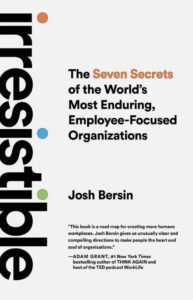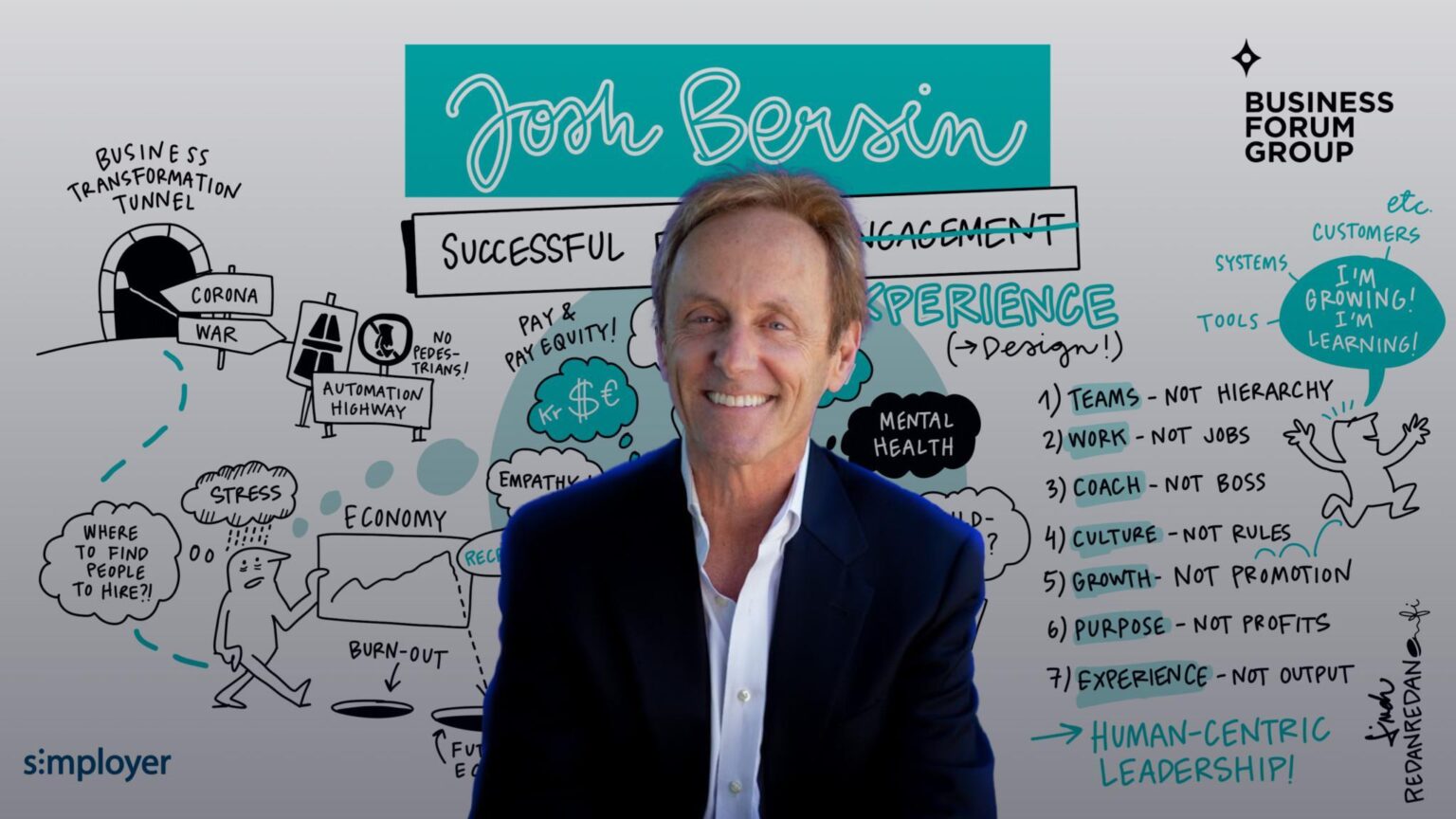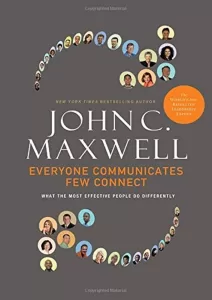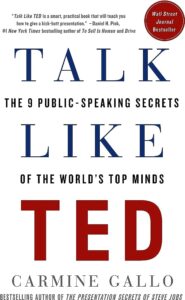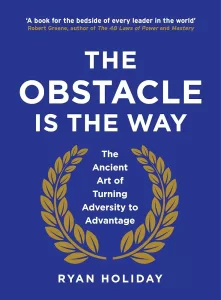Book Review: “Irresistible”
Book: Irresistible by Josh Bersin
Reviewer: Bobby Powers
My Thoughts: 9 of 10
Bersin is one of the foremost learning & development (L&D) experts in the world, and this book explains why. He couples data with rich experience to explain why the best—and most profitable—companies succeed by putting their people first. Irresistible is one of the best books I've ever found for company leaders and HR managers. It's an excellent manual that explains why and how to invest in your people to build a better, more effective business.
What I Learned from the Book
Bersin put numbers to things I've known for a while:
- It pays to invest in your people.
- The companies that prioritize employee experience are often even more profitable than the ones that prioritize profit.
- Creating a culture of continuous learning is the best way to attract and retain the best people while also dominating your industry.
Selected Quotes and Ideas from the Book
Background
- "In this book, I am going to reveal seven secrets of the most employee-focused organizations across the world. These are essentially fundamental management values: strategies and philosophies that embrace the power of every individual...But let me warn you, this is not as easy as it sounds. You can't just copy the programs or innovations of others."
- "The foundation of transformation lies in management: how we manage, organize, and empower our people."
- The 7 secrets of the world's most enduring, employee-focused organizations:
- Teams, not hierarchy
- Work, not jobs
- Coach, not boss
- Culture, not rules
- Growth, not promotion
- Purpose, not profits
- Employee experience, not output
I love this cool graphic from the Nordic Business Forum that explores Bersin's 7 principles:
Teams, not Hierarchy
- "The traditional hierarchy dates back to the Industrial Revolution...Detailed job descriptions told employees exactly what was required, and bosses made sure they completed their tasks."
- "Not only do hierarchies slow down decision-making, but they also hurt people's aspirations."
- Rather than working in hierarchical structures, we should allow self-organizing, cross-functional project teams—similar to how some consulting firms operate.
- "Teams make sense for many reasons: they are more engaging, they are quick to form and disband, and over time they generate camaraderie and trust. Just as sports teams operate with clear roles and values, business teams can do the same."
- "The focus is on empowering the individual: building a small, well-defined team; ensuring the team makes progress every day; and focusing on design, collaboration, and feedback."
Work, not Jobs
- "'Work' is happening everywhere in the world, regardless of whether one has an actual 'job.'"
- "In 2020, 59 million employable Americans worked in part-time, contingent, gig, or other forms of freelance work assignments, an increase from the 53 million Americans doing the same in 2014. And a recent study found that almost two-thirds of all younger workers now have 'side hustles' to complement their full-time jobs."
- "The bottom line is this: we have moved from an economy where your employer defines your career to one where your skills, experience, and ambition drive success."
- "People who move from one function to another (from HR to sales, from sales to marketing, and from finance to operations) always outperform their peers."
- At some companies, because there's no internal mobility program or culture of changing departments, the best way to change jobs is to quit and reapply. That's absurd.
Coach, not Boss
- "[W]hile we all want leaders to be great businesspeople, decision-makers, and project leaders, above all they need to be great drivers of culture. People watch their behavior, they do what leaders do, and they learn from the way leaders reward or punish activity."
- "Today's successful leaders lead by example, empowerment, and inspiration instead of by position, level, or title."
- "You know you're a good leader when you have good followers." -Colin Powell
- "Remember that managers, like fish in a fishbowl, behave the way they are rewarded. If we want to get managers to be coaches, we have to reward coaching, feedback, development, progression, and continuous learning."
- "Do you reward talent consumption of talent production? Do managers get rewarded for hoarding great people and getting them to stay on their teams? Or do you encourage and reward managers for moving people out of their teams and into new development opportunities?"
Culture, not Rules
- "Workplace design really does matter...There is an almost perfect correlation between an employee's level of engagement and his or her satisfaction with the physical workplace."
- "88 percent of employees feel more engaged and productive when they can select where they do their work."
- "96 percent of employees feel more engaged and productive when they can move around and change posture during the day."
- "Recognition has a tremendous impact on performance. My research suggests that companies with high-recognition cultures have as much as 30 percent lower voluntary turnover ratios on average."
Growth, not Promotion
- "As I've studied this topic over the years, I've continuously found that the highest performing companies always have one thing in common: they embrace a culture of learning. People are able to take time to learn, they have a culture of sharing and development, and managers are coaches, mentors, and educators at heart."
- "For you as an employee or a manager, continuous learning has become one of your most valued skills. As I like to say, 'The learning curve is the earning curve.'"
- "Being busy doesn't make a company grow; thinking about how to do things better does." -Thomas Watson, founder of IBM
- "In our research, which mapped more than 40 management practices against long-term business results, we found that the most important practice in learning is being willing to discuss mistakes."
- "Remember one important thing: continuous career development helps your company and your people in myriad ways. It helps individuals stay relevant; it improves engagement and retention; it strengthens your brand so you can attract high-performing people; and, of course, it makes sure your employees are skilled and relevant to your business."
- Bersin's "4 E's" of employee growth:
- Education (training)
- Experience (projects and jobs)
- Exposure (mentors, coaches, and peers)
- Environment (an organization that gives people time, rewards, and opportunities to learn)
Purpose, not Profits
- "Unless you deliver on purpose, you cannot deliver performance." -Indra Nooyi, Former CEO of PepsiCo
- "Profits are important to a company because they affect the company's ability to secure financing and attract investors who can increase working capital and fund business growth. But purpose is the real fuel of a company. It gives people the energy, enthusiasm, and creativity to add value in many ways."
- "During the course of many business cycles, including the current one, companies with excellent employee experiences outperform those with poor employee experiences."
- "Profit, rather than being a goal, is an outcome."
Employee Experience, not Output
- "If we win the hearts and minds of employees, we're going to have better business success." -Mary Barra, CEO of General Motors
- "[T]he most important factor in employee experience is not technology, it's trust. Do your people feel a sense of purpose and mission? Are you and your peers good at listening and responding to people? Are you able to react and respond when employees point out problems?
- "In today's economy, where innovation, service, and brand matter more than ever, you should always be thinking about how you can energize, empower, and support your people."
Think you’d like this book?
Other books you may enjoy:
- Work Rules! by Laszlo Bock
- No Rules Rules by Reed Hastings and Erin Meyer
- Creativity, Inc. by Ed Catmull with Amy Wallace
Other notable books by the author:
Want to become a stronger leader?
Sign up to get my exclusive
10-page guide for leaders and learners.
